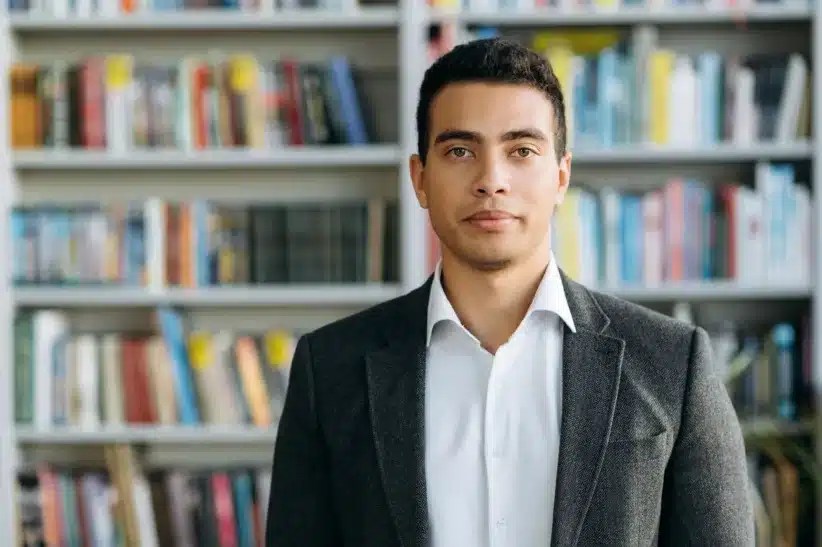
NYC Teachers Grapple with Discussing the Israel-Hamas War in the Classroom
As the war in Gaza continues, New York teachers and educators are grappling with their own conflict: How—or if—to discuss the war in classrooms, especially as passions for both sides remain strong.
After Hamas terrorists attacked the Israeli people on Oct. 7 and fighting continues, schools chancellor David Banks sent several email correspondence to educators, instructing and advising them on how to talk to students about this controversial and tragic current event.
Some teachers are choosing to actively discuss the war in class, while others aren’t—some out of fear of becoming victims of violence themselves, some out of fear of losing their jobs.
Banks condemned all the acts of violence and reminded teachers to keep their personal political views outside of school.
“Our job as educators is to expose our students to objective facts and multiple perspectives, allowing them to make their own judgments and grow as independent and critical thinkers,” the chancellor wrote in an email to teachers. “Injecting our own ideologies or political opinions risks shutting down discussions and excluding students who hold different views.”
The chancellor also discussed on CBS New York the importance of acceptable forms of protest by both students and teachers.
“We want our students and teachers to express their voice, but we’ve got to do it in responsible ways,” he said. “We want our kids to be informed even as they’re protesting, they have to continue to learn about what these issues are.”
Discussing the Israel-Hamas War in the Classroom
As for simply discussing the facts of the war—without offering opinion—some teachers are choosing to do so.
Sari Beth Rosenberg, a NYC public school history teacher in Manhattan, isn’t shying away from the topic. She feels it’s important to discuss the war in class, but in as unbiased a way as possible, especially since her students are already talking about it with each other.
“A student in one of my history classes posed the question to me: ‘Are you team Israeli or team Palestinian?’” Rosenberg said. “I said, ‘I’m team humanity.’ And that’s what I am.”
But it didn’t end there, as she wanted her students to have a factual and thoughtful discussion about what is going on in the region.
She turned the question over to the students asking what they knew and thought about the war. Her student population is diverse, and many of them shared what they already knew and what they were feeling. Although the conversation became tense at times, Rosenberg did her best to make sure her students felt safe and heard. They listened to each other.
“Most of the history teaching going on at least at the high school level is having kids think like historians, engage with documents and look for reliability of sources,” Rosenberg explained. “There are ways to teach this stuff without imposing your point of view. Some teachers might not even have a point of view. It seems if you go online teachers are divided over this, but when you engage in one-on-one conversations, I’d like to think people can find some common ground.”
Josephine Maria Natoli teaches at Brooklyn Technical High School. She agrees that the war should be discussed in school in a fair, objective way without personal bias, but worries how such instruction would be construed.
“It’s hard for me to suggest a way for it to be taught these days. I’m 34 and the way I was raised and the people around weren’t so sensitive about everything,” she said. “I can understand why people don’t want to discuss the war, but it does need to be spoken about.”
Natoli added that to fairly and safely discuss topics such as the Israel-Hamas war is to change the thinking of being “triggered” and “erasing history.”
“Everyone is so strong and wrong these days that they’ve lost the ability to empathize,” she said.
Some Teachers are Showing Support for Israel or Palestine
Some teachers and schools are more direct with their students on whether they support the Israelis or Palestinians.
At Gateway Academy, a private school on Staten Island, teachers are free to discuss the issue and teachers discuss it as a staff, explained Christopher DeSanctis, head of the school.
“Our American Sign Language class recently learned to sign Israel’s national anthem, called The Hatikvah (the Hope),” DeSanctis said. “Our ASL instructor shared a conversation on the significance of Israel’s relationship to the United States.”
But a public school teacher from Staten Island, who is Palestinian American, said she is upset with Mayor Eric Adams and the schools chancellor. She feels she’s not permitted to talk about the war in the same way other controversial issues have been discussed in schools.
Psst...check out Flu Symptoms in Kids: How Parents can Differentiate from the Flu, COVID or a Cold
“After Eric Garner and George Floyd we had to talk to the kids and make sure they were ok,” the teacher, who wanted to remain anonymous, said. “And they were so scared of riots and protests. Now we have children in Gaza and we have Arabic kids in our schools from all over. Why can’t we talk about it and make sure our kids are ok?”
Avoiding Discussions about the War
With a war across the world sparking violence and fear right here in NYC, it’s not surprising that many teachers are opting to avoid the subject with their students as much as possible.
In October, Jewish students were locked in their school’s library while pro-Palestinian demonstrators pounded on the doors and shouted.
At Hillcrest High School in Queens last month, 400 students acted disruptively during school hours and called for the removal of a teacher because she supports Israel. The teacher was moved to safety.
Banks made it clear that the teacher did nothing wrong.
“The teacher at Hillcrest High School was targeted based on her support for Israel, expressed in a permissible way outside of school hours and her Jewish identity,” the chancellor said. “It’s completely unacceptable that she would be targeted for that.”
Disciplinary action was taken against several of the students involved in the incident.
Because of scenarios like this, other teachers are choosing not to talk about the war at all.
“I teach high school English and I’m not talking about it,” said one city teacher who, like some others New York Family spoke to, wanted to remain anonymous. “Students are free to speak with me or express their opinions, but I remain impartial.”
She added that choosing to talk about the war is really about whether parents are in favor of such discussions or not.
“This is extremely tough to navigate because when it comes down to it, it’s going to end up being whether the parents approve of this discussion or not,” she said.
Melissa, a Jewish mother from Staten Island, is concerned about teachers who “indoctrinate” kids who look to them as leaders.
“Many teachers are actively participating in walkouts and are doing everything in their power to embolden and indoctrinate young impressionable minds with one-sided propaganda,” she said.
Another NYC public high school teacher who requested anonymity, doesn’t want to discuss anything about the war out of fear of losing her job.
“I just don’t want to get in trouble. I had a few students who tried to talk about it but I couldn’t respond or say anything back,” she said.
The teacher added that if she felt empowered to talk about it with students, she would only say things to ease their minds and keep them calm.
“I would have to think about both sides. I wouldn’t want to offend any of my students and make them uncomfortable,” she said.
More Information
The DOE has online resources available for teachers to facilitate supportive conversations about current events like the Israel-Hamas war. If you’re a parent, this article provides information and resources on how you can talk to your children about the war while opening up a dialogue for understanding, critical thinking and empathy.























